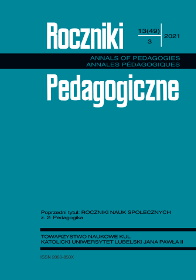Preparing Future Teachers for Inclusive Education – International Guidelines and Directions of Changes
Main Article Content
Abstract
The aim of the paper is to point at the changes that are taking place in the area of preparing preservice teachers to work in inclusive schools with students with special educational needs. The directions of changes included in the latest international reports and in the Polish model of education for all were discussed. The new postulates constitute a challenge for teachers reporting a need for further education in this field. The educational programs of preservice teachers require changes so that they prepare them to work with a diverse group of students. It is postulated that in the academic preparation: 1) a comprehensive approach to the study program, based on the biopsychosocial model, should be taken into account, 2) as part of subjects related to special education, conducted by academic teachers with scientific achievements and practical experience in this area, preservice teachers should be equipped not only with competences related to working with a diverse group of students, but also cognitive competences, including knowledge about various types of disabilities and their specific educational needs as well as implementation competences related to the practical skills of working with students with various types of special needs.
Article Details
References
AlMahdi, O., Bukamal, H. (2019). Pre-Service Teachers’ Attitudes Toward Inclusive Education During Their Studies in Bahrain Teachers College. SAGE Open, July-September, 1-14.
Chrzanowska I., Szumski G. (2019). Kompetencje zawodowe – jakie wyzwania? W: I. Chrzanowska, G. Szumski (red.), Edukacja włączająca w przedszkolu i szkole (s. 54-61). Warszawa: Wyd. FRSE.
Chrzanowska, I. (2019). Nauczyciele o szansach i barierach edukacji włączającej. Warszawa: Wydawnictwo Naukowe PWN.
Domagała-Zyśk, E. (2020). Projektowanie uniwersalne w inkluzyjnej edukacji uczniów ze spektrum autyzmu. Strategie i rekomendacje. W: A. Prokopiak (red.), Osoby ze spektrum autyzmu w biegu życia (s. 139-158). Lublin: Wyd. UMCS.
Domagała-Zyśk, E., Knopik, T. (2020). Functional Diagnosis as a Strategy for Implementing Inclusive Education in Poland. Revista Brasileira de Educacao Especial, 26(2), 203-220.
Domagała-Zyśk, E., Knopik, T., Oszwa, U. (2018). Znaczenie diagnozy funkcjonalnej w edukacji uczniów ze specjalnymi potrzebami edukacyjnymi. Roczniki Pedagogiczne, 10(46), 77-90.
Education International and UNESCO (2019). Global Framework of Professional Teaching Standards. Brussels: Education International and UNESCO.
Edukacja dla wszystkich – ramy rozwiązań legislacyjno-organizacyjnych na rzecz wysokiej jakości kształcenia włączającego dla wszystkich osób uczących się (2020). Warszawa. MEW _wersja_pelna.pdf (wartowiedziec.pl) (dostęp 30.03.2021).
Europejska Agencja Rozwoju Edukacji Uczniów ze Specjalnymi Potrzebami (2012). Kształcenie nauczycieli przygotowujące do edukacji włączającej: Profil nauczyciela edukacji włączającej. Dania, Odense. Kształcenie nauczycieli przygotowujące do edukacji włączającej - PROFIL NAUCZYCIELA EDUKACJI WŁĄCZAJĄCEJ (european-agency.org) (dostęp 30.03.2021).
Europejska Agencja Rozwoju Edukacji Uczniów ze Specjalnymi Potrzebami (2011). Kształcenie nauczycieli przygotowujące do edukacji włączającej w Europie: Wyzwania i szanse. Dania Odense. AGENCY REPORT – STANDARD FORMATS (european-agency.org) (dostęp 30.03.2021).
Florian, L. (2019). Preparing Teachers for Inclusive Education. In: M. Peters (eds.), Encyclopedia of Teacher Education. Singapore: Springer. https://doi.org/10.1007/978-981-13-1179-6_39-1 (dostęp 30.03.2021).
Florian, L., Spratt, J. (2013). Enacting inclusion: a framework for interrogating inclusive practice. European Journal of Special Needs Education, 28(2), 119-35.
Forlin, C., Chambers, D. (2011). Teacher preparation for inclusive education: increasing knowledge but raising concerns. Asia-Pacific Journal of Teacher Education, 39(1), 17-32.
Jachimczak, B. (2019). Nauczyciel w edukacji włączającej. W: I. Chrzanowska, G. Szumski (red.), Edukacja włączająca w przedszkolu i szkole (s. 138-159). Warszawa: Wyd. FRSE.
Kim, J.R. (2011). Influence of teacher preparation programmes on preservice teachers’ attitudes toward inclusion. International Journal of Inclusive Education, 15(3), 355-377.
O’Neill, S. (2016). Preparing Preservice Teachers for Inclusive Classrooms: Does Completing Coursework on Managing Challenging Behaviours Increase Their Classroom Management Sense of Efficacy? Australasian Journal of Special Education, 40(2), 117-140. doi:10.1017/ jse.2015.10.
Papuda-Dolińska, B. (2019). Kształcenie nauczycieli do edukacji włączającej w Polsce. Forum Oświatowe, 31(2), 61-79.
Plichta, P. (2012). Przygotowanie nauczycieli do edukacji włączającej – kontekst europejski. W: D. Podgórska-Jachnik (red.), Dobre praktyki pedagogiczne szansą innowacyjnej edukacji (s. 101-117). Łódź: WN WSP.
Rakap, S., Cig, O. and Parlak-Rakap, A. (2017). Preparing preschool teacher candidates for inclusion: impact of two special education courses on their perspectives. Journal of Research in Special Educational Needs, 17, 98-109.
Rouse, M., Florian, L. (2012). The Inclusive Practice Project: Final Report. Aberdeen: UK, University of Aberdeen.
Rozporządzenie Ministra Nauki i Szkolnictwa Wyższego z dnia 25 lipca 2019 r., w sprawie standardu kształcenia przygotowującego do wykonywania zawodu nauczyciela Dz.U. z 2.08.2019., poz. 1450. Załącznik nr 2. Standard kształcenia przygotowującego do wykonywania zawodu nauczyciela przedszkola i edukacji wczesnoszkolnej (klasy I-III szkoły podstawowej).
Schleicher, A. (2018). TALIS Insights and Interpretations. Teaching and Learning International Survey TALIS2018_insights_and_interpretations.pdf (oecd.org) (dostęp 30.03.2021).
Światowa Organizacja Zdrowia. (2009). Międzynarodowa Klasyfikacja Funkcjonowania Niepełnosprawności i Zdrowia. Microsoft Word – ICF Polish version.doc (cez.gov.pl) (dostęp 31.03.2021).
Theoharis, G., Causton-Theoharis, J. (2011). Preparing pre-service teachers for inclusive classrooms: revising lesson planning expectations. International Journal of Inclusive Education, 15(7), 743-761.
Troll, B., Besser, M., Abels, S., Ahlers, M., Greve, S., Leiss, D., Süßenbach, J. (2019). Preparing Pre-service Teachers for Inclusive Education: Analyzing the Status Quo and Comparing the Effect of Different Types of Subject-Specific Learning Opportunities (ss. 537-559). In: D. Kollosche, R. Marcone, M. Knigge, M. Penteado, O. Skovsmose (eds.), Inclusive Mathematics Education. Springer, Cham, https://doi.org/10.1007/978-3-030-11518-0_31 (dostęp 30.03.2021).
UNESCO. (2020a). Global Education Monitoring Report Summary 2020: Inclusion and education: All means all. Paris Inclusion and Education: Global Education Monitoring Report (unesco.org) (dostęp 30.03.2021).
UNESCO. (2020b). Inclusive teaching: Preparing all teachers to teach all students: Global Education Monitoring Report Policy, Paper 43, October. Inclusive teaching: Preparing all teachers to teach all students: Global Education Monitoring Report (unesco.org) (dostęp 30.03.2021).
UNESCO. (2020c.) Światowy raport nt. edukacji – streszczenie, 2020: Włączanie i edukacja: dla wszystkich, bez wyjątku. Światowy raport nt. edukacji – streszczenie, 2020: Włączanie i edukacja: dla wszystkich, bez wyjątku – UNESCO Digital Library (dostęp 30.03.2021).
Zamkowska, A. (2019). Model nauczyciela wczesnoszkolnej edukacji włączającej. Roczniki Pedagogiczne, 11(47)2, 93-103.

